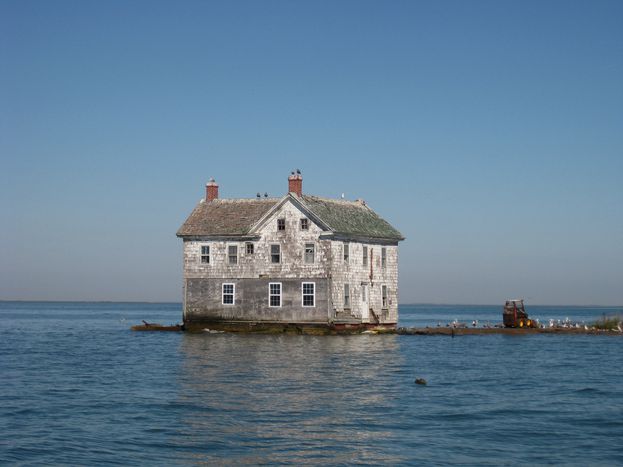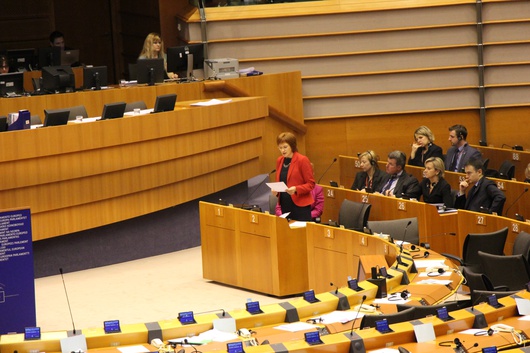
Poles apart: the EU debates new climate change agreement
Published on
On the evening of the 28th of January, a roadmap towards a new international climate change agreement was under discussion at the European Parliament.
The purpose was to come to a consensus within the EU regarding a new global agreement on climate change. The final talks should be concluded at the Paris UN climate summit COP21 in December 2015.
The aim for the Paris summit is ambitious - to arrive at a new legally binding global agreement to fight climate change aggravated by human activity. With the Kyoto Protocol expired since 2012, world leaders are finally preparing for a new global deal in the fight against rising sea levels and global temperatures.
We have been witnessing a surge in global climate change awareness. There have been a plethora of protest marches, countless websites promoting awareness and cities pledging to prepare for the adverse effects of climate change. This issue is high on the agenda in Europe, other major economies and, of course, in countries most vulnerable to climate change.
The overall targets
It is an ambitious goal to reach an agreement that is legally binding to all parties, including the United States and China. The ultimate goal is to limit the global temperature increase to below 2°C, relative to the pre-industrial era. The United Nations Intergovernmental Panel on Climate Change (UNIPCC) has indicated that in order to limit the increase below 2°C, global emissions should be reduced by 40-70% by 2050 (compared to 2010). The overall global target is to reach zero emissions by 2100. This is an enormous challenge.
But first, a common agreement has to be reached within the EU. In October 2014, EU leaders endorsed a target to reduce EU’s domestic emissions by 40% in 2030 (compared to 1990). This is to be added to the long-term target of reducing emissions by 80-95% by 2050. The EU contribution to the global target will be presented to UNIPCC within the first quarter of this year.
The Lima climate talks held in December 2014 were supposed to set a clear plan to keep the discussion on track to reach a final global agreement at the Paris summit in 2015. The results left much to be desired and many issues are still up in the air. The main concern for poorer countries is what the level of financial impact and support will come from the wealthier nations.
The debate at the European Parliament
 The general mood at the debate held between the MEPs, the Council and the Commission conveyed a sense of urgency from the EU. The hope and expectation from the EU is that other major economies will follow Europe’s example. The Environmental Council in March will be the first opportunity to discuss the EU expectations and strategy. The commissioner for Climate Action and Energy, Miguel Arias Cañete, is tasked with proposing legislation to realise the EU's 2030 climate and energy framework, as well as steering negotiations with the European Parliament and national governments.
The general mood at the debate held between the MEPs, the Council and the Commission conveyed a sense of urgency from the EU. The hope and expectation from the EU is that other major economies will follow Europe’s example. The Environmental Council in March will be the first opportunity to discuss the EU expectations and strategy. The commissioner for Climate Action and Energy, Miguel Arias Cañete, is tasked with proposing legislation to realise the EU's 2030 climate and energy framework, as well as steering negotiations with the European Parliament and national governments.
According to Cañete, the main issues surrounding the future agreement include an unclear legal format for the agreement, the funding of the climate change action and the national financing for the goals set by each country. Such obstacles will be a huge challenge for the EU over the course of 2015.
Clash between EU member states
Although many MEPs emphasized solidarity and co-operation within Europe for climate change agreement there were also dissenting voices. Especially forthright were the Polish MEPs Marek Jurek and Andrzej Duda from the eurosceptic ECR (European Conservatives and Reformist Group) at the European Parliament.
They stressed that the Polish economy would collapse, should the target emissions requirements be enacted. The duo also spoke out for the poorer Easter European states that would be hardest hit by new requirements to reach the EU's contribution targets. Member states with heavy industry and less money to invest into new technologies are in a definite disadvantage. According to MEP Andrzej Duda, the EU economy will become less competitive, as the rest of the world does not agree with the EU's current reduction plans for the coming decades.
One of the main concerns raised in climate summits going back over 20 years is the clear division between the wealthy and poor nations around the world. In this respect, the opinions expressed at the European Parliament were not new. It is clear that many less wealthy member states will not go along with the EU-wide plans if they stand to suffer greatly. A compromise to support to poorer EU member states may have to be guaranteed.
What's next?
All countries, including EU member states, must bring forward their national plans for the purpose of forging an agreement in three months’ time. Without clear proposals, there will be nothing to discuss at the Paris summit. With less than 10 months to go, there is a lot of work ahead. Ideally, the new agreement should be legally binding and accepted by everyone. If not, our collective potential to reduce global warming will be severely hampered.



